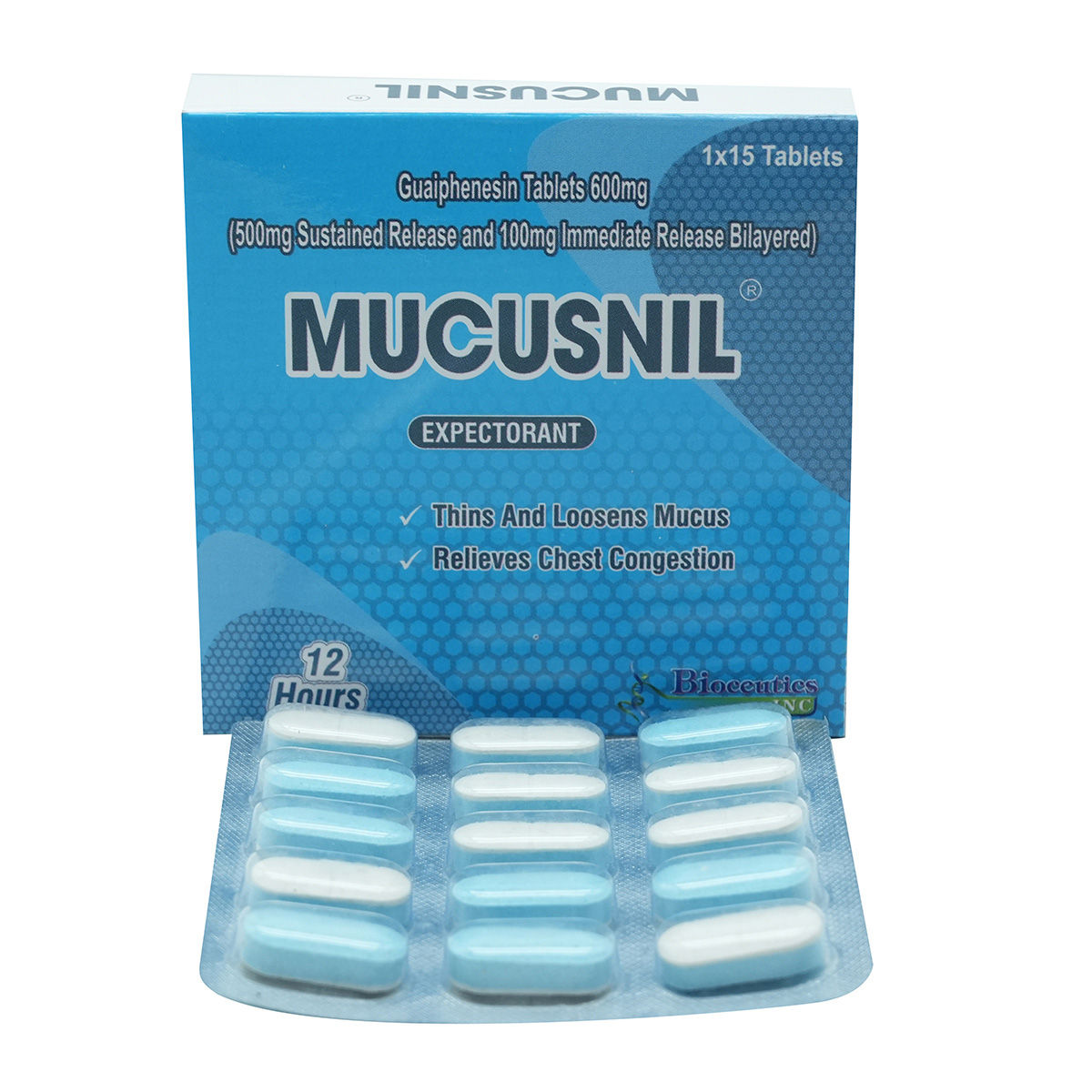Guaifenesin
About Guaifenesin
Guaifenesin belongs to the class of medications called expectorants primarily used to treat a cough with mucus. A sudden expulsion of air through the large breathing passages can help clear them of fluids, irritants, foreign particles, and microbes. There are two types of coughs, namely: dry cough and chesty cough (wet cough). A dry cough is tickly and doesn't produce any vicious or thick mucus, while a chesty cough (wet cough) means mucous or sputum is produced to help clear your airways. Guaifenesin is mainly used for the treatment of wet cough.
Guaifenesin contains 'Guaifenesin'. Guaifenesin works by reducing the thickness of mucus in the air passages, this makes it easier to cough up the mucus and clear the airways.
Take Guaifenesin as recommended. Your doctor will recommend how often you take Guaifenesin based on your medical condition. Some people may experience nausea, vomiting, stomach pain, diarrhea, itchy rash, and hypersensitivity. Most of these side effects of Guaifenesin do not require medical attention and gradually resolve over time. However, if the side effects persist or worsen, please consult your doctor.
If you are allergic to Guaifenesin or any other medicines, please tell your doctor. Guaifenesin is not recommended for children below 2 years of age, as the safety and effectiveness were not established. If you are pregnant or breastfeeding, it is advised to inform your doctor before using Guaifenesin. If you are about to undergo any surgery that requires anaesthesia, please inform your doctor that you are taking Guaifenesin. Drink plenty of fluids while taking Guaifenesin to loosen mucus. If you have diabetes, asthma, overactive thyroid, porphyria, phenylketonuria (a birth defect that causes accumulation of amino acid, phenylalanine in the body), kidney, liver, or heart problems, inform your doctor before taking Guaifenesin.
Uses of Guaifenesin
Medicinal Benefits
Guaifenesin contains 'Guaifenesin', which belongs to the class of medications called expectorants primarily used to treat a cough with mucus. Guaifenesin works by reducing the thickness of mucus in the air passages, this makes it easier to cough up the mucus and clear the airways.
Directions for Use
Storage
Side Effects of Guaifenesin
- Nausea
- Vomiting
- Dry mouth or chapped lips
- Stomach pain
- Diarrhoea
- Dizziness
- Constipation
- Itchy rash
- Formation of kidney stones
- Hypersensitivity
Drug Warnings
If you are allergic to Guaifenesin or any other medicines, please tell your doctor. Guaifenesin is not recommended for children below 2 years of age, as the safety and effectiveness were not established. If you are pregnant or breastfeeding, it is advised to inform your doctor before using Guaifenesin. If you are about to undergo any surgery that requires anesthesia, please inform your doctor that you are taking Guaifenesin. Drink plenty of fluids while taking Guaifenesin to loosen mucus. If you have diabetes, asthma, overactive thyroid, porphyria, phenylketonuria (a birth defect that causes accumulation of amino acid, phenylalanine in the body), kidney, liver, or heart problems, inform your doctor before taking Guaifenesin. Guaifenesin is not recommended for use in patients taking cough suppressants since they have opposite effects. Coadministration of these medicines may result in severe adverse effects and worsen the patient's condition. Guaifenesin may cause dizziness in some patients. It is advised that you do not perform any activities such as driving a vehicle or operating machinery if you experience dizziness during treatment with this medicine. Tell your doctor if you smoke and if you have or have ever had a cough that occurs with a large amount of phlegm (mucus) or if you have or have ever had a breathing problem such as asthma, emphysema, or chronic bronchitis. If you are taking the dissolving granules, tell your doctor if you are on a low magnesium diet or kidney disease.
Drug Interactions
Drug-Drug Interaction: Guaifenesin may interact with Serotonergic drugs (dextromethorphan), muscle relaxants (baclofen), monoamine oxidase inhibitors (phenelzine).
Drug-Food Interaction: Avoid using dairy products like milk, curd with Guaifenesin.
Drug-Disease Interaction: If you have diabetes, asthma, phenylketonuria (a birth defect that causes accumulation of amino acid, phenylalanine in the body), kidney, liver, porphyria, or heart problems, inform your doctor before taking Guaifenesin.
Drug-Drug Interactions Checker List:
Safety Advice

Alcohol
consult your doctorThe interaction of alcohol with Guaifenesin is unknown. Please consult a doctor before consuming alcohol with Guaifenesin.

Pregnancy
consult your doctorThe safety of Guaifenesin in pregnant women is unknown. Therefore, it is given to pregnant women only if the doctor thinks the benefits outweigh the risks.

Breast Feeding
cautionGuaifenesin is not recommended for use in breastfeeding women unless necessary. All the risks and benefits should be discussed with the doctor before using this Guaifenesin. If the Guaifenesin is used, the infant should be monitored closely for any undesired side effects.

Driving
cautionGuaifenesin may cause dizziness or drowsiness in some people. Therefore, drive only if you are alert after taking Guaifenesin.

Liver
cautionTake Guaifenesin with caution, especially if you have a history of Liver diseases/conditions. The dose may be adjusted by your doctor as required.

Kidney
cautionTake Guaifenesin with caution, especially if you have a history of Kidney diseases/conditions. The dose may be adjusted by your doctor as required.

Children
cautionGuaifenesin is not recommended for children below 2 years of age. However, please consult a doctor before using Guaifenesin in children.
Habit Forming
Diet & Lifestyle Advise
- Avoid dairy products such as milk as they may increase mucus production. Also, avoid processed or refined foods to have relief from cough. Instead, replace baked foods, fried foods, white bread, white pasta, French fries, sugary desserts, and chips with green leafy vegetables.
- Drink plenty of fluids to avoid dry throat while you have a cough and loosen mucus.
- Avoid citrus fruits as they may worsen the cough. Eat fruits rich in water content such as pears, watermelon, peaches, and pineapples.
Patients Concern
Disease/Condition Glossary
Cough: Coughing is the body’s way of clearing irritants (like allergens, mucus, or smoke) from airways and preventing infection. Coughs may be dry or productive. A productive cough (wet cough) brings up sputum (phlegm, mucus, and other matter) from the lungs. Cough is commonly caused as a response to allergy or viral infection but coughing up mucus is possibly an indication of infection in the respiratory tract. If you are coughing thick, solid white mucus, it indicates you may have a bacterial infection in the airways. If the mucus is clear or light-coloured, it indicates you may have allergies or a minor infection in the respiratory tract, and yellow or green mucus indicates a respiratory infection. Cough production is common in asthma, COPD, and other respiratory disorders like bronchitis (airway inflammation and infection).
FAQs
Guaifenesin is used to treat Cough with mucus.
Guaifenesin contains Guaifenesin. Guaifenesin works by reducing the thickness of mucus in the air passages, this makes it easier to cough up the mucus and clear the airways.
Common side effects of Guaifenesin include nausea, vomiting, stomach pain, diarrhea, itchy rash, hypersensitivity. Most of these side effects of Guaifenesin do not require medical attention and gradually resolve over time. However, if the side effects persist or worsen, please consult your doctor.
Yes, Guaifenesin may cause drowsiness or dizziness. It is not necessary for everyone taking Guaifenesin to experience this side effect. However, avoid driving or doing any hazardous tasks if you feel drowsy or dizzy after taking Guaifenesin.
You are recommended to take Guaifenesin for as long as your doctor has recommended it. However, if the symptoms persist or worsen with rash, fever, or persistent headache after one week of using Guaifenesin, please consult your doctor.
Guaifenesin is not recommended for use in patients taking dextromethorphan (cough suppressant) since they have opposite effects. Coadministration of these medicines may result in severe adverse effects and worsen the patient's condition.
Please inform your doctor if you have high blood pressure before taking Guaifenesin as it may affect the cardiovascular system.
Yes, you can generally take guaifenesin with phenylephrine, ibuprofen, amoxicillin, and paracetamol (acetaminophen), as there are no known drug-drug interactions. However, consult your doctor before taking other medicines with Guaifenesin.
Yes, you can take Guaifenesin with other cold and cough medications if advised by the doctor. However, you should avoid other formulations containing guaifenesin to prevent a double dose.








